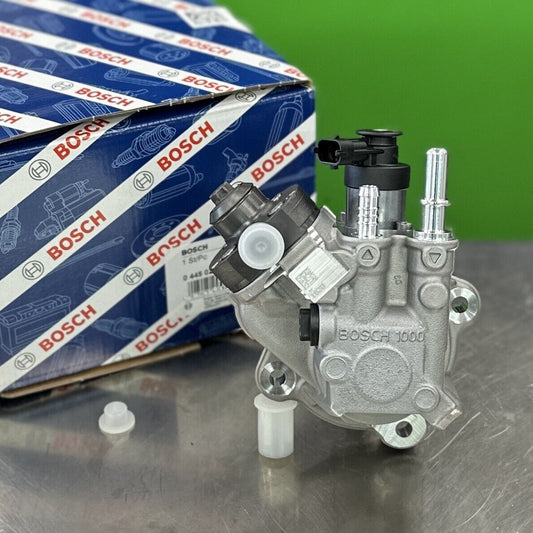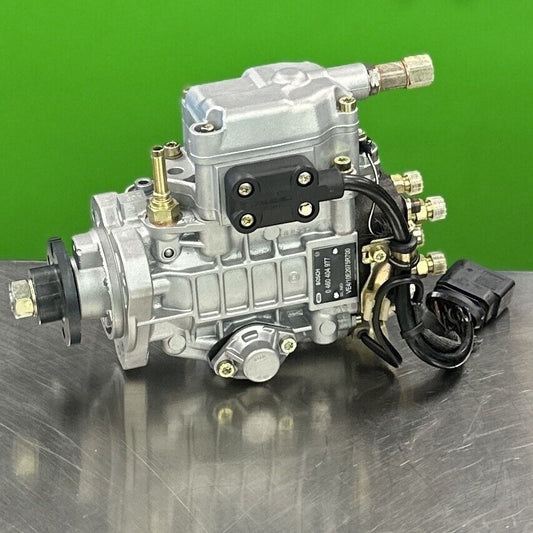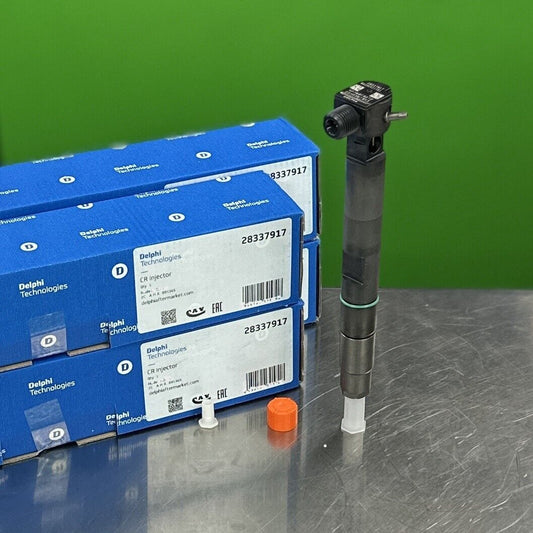GM 6.6L LLY Bosch CR Injection Pump CP3 Troubleshooting: Diagnosing and Solving Common Problems
This article delves into the common issues that arise with the GM 6.6L LLY Bosch CR Injection Pump CP3, offering valuable diagnostic insights and effective solutions to tackle these problems head-on.
When the engine fails to start, it could be a red flag for underlying issues concerning fuel delivery, air intake, or electrical components associated with the injection pump. To troubleshoot this issue, it is crucial to meticulously inspect fuel pressure, filters, and connections to identify and rectify any potential issues.
Low fuel pressure is a common culprit behind poor engine performance and frequent stalling. This problem can stem from various sources such as a malfunctioning pressure regulator, fuel system leaks, or a congested filter. By conducting a thorough examination of these components and promptly replacing any faulty parts, you can restore optimal fuel pressure levels and enhance engine efficiency.
Unusual noises emanating from the injection pump can be indicative of internal damage or wear. To pinpoint the origin of these sounds, it is advisable to visually inspect the pump for any visible signs of damage or seek professional assistance for a comprehensive diagnosis. Addressing these noise-related issues promptly can prevent further complications and ensure the smooth operation of the injection pump.
Erratic engine performance, characterized by irregular idling or sudden power loss, often points towards underlying injection pump issues. By conducting a comprehensive assessment of the pump, fuel lines, and associated components, you can uncover the root cause of these performance fluctuations and implement targeted solutions to restore optimal engine functionality.
Fuel leaks around the injection pump not only pose safety hazards but also have a detrimental impact on engine performance. It is imperative to inspect connection points, seals, and fittings for any signs of leaks and promptly address them to prevent further damage. By addressing fuel leaks in a timely manner, you can safeguard both the injection pump and the overall performance of the engine.
Failure to Start
Failure to start is a frustrating issue that can indicate various underlying problems with the GM 6.6L LLY Bosch CR Injection Pump CP3. When your engine refuses to kick into action, it's like a car that won't start on a cold winter morning - a real headache. The culprit behind this could be related to fuel delivery, air intake, or electrical components associated with the injection pump. It's like trying to light a fire without any matches - you need the right elements to get things going.
To diagnose the reason behind the failure to start, you need to play detective and investigate different aspects of the injection pump system. First and foremost, check the fuel pressure to ensure that the pump is delivering fuel effectively. It's akin to checking if the fuel tank is empty or if the fuel line is blocked. Next, inspect the filters to see if they are clogged and restricting the flow of fuel. It's similar to ensuring that the air vents in a room are not blocked, allowing fresh air to circulate.
Moreover, pay close attention to the connections related to the injection pump. Just like ensuring all the wires are properly connected in a circuit, loose or faulty connections can disrupt the flow of fuel and prevent the engine from starting. It's like trying to turn on a light switch with a broken wire - no matter how many times you flick the switch, the light won't come on.
In summary, a failure to start with the GM 6.6L LLY Bosch CR Injection Pump CP3 can be a result of issues with fuel delivery, air intake, or electrical components. By troubleshooting the fuel pressure, filters, and connections, you can unravel the mystery behind why your engine is refusing to start and get back on the road smoothly.
Low Fuel Pressure
Low fuel pressure in the GM 6.6L LLY Bosch CR Injection Pump CP3 can be a significant issue that affects the engine's performance and overall functionality. When the fuel pressure is below the recommended levels, it can lead to various problems such as engine stalling, rough idling, and decreased power output. To effectively address low fuel pressure, it is essential to identify the root cause and take appropriate measures to rectify the issue.
One common cause of low fuel pressure is a faulty pressure regulator within the injection pump. The pressure regulator is responsible for maintaining the optimal fuel pressure required for efficient engine operation. If the regulator is malfunctioning or failing, it can result in decreased fuel pressure, impacting the engine's performance. In such cases, replacing the pressure regulator with a new, high-quality component is necessary to restore proper fuel pressure levels.
Another potential reason for low fuel pressure is the presence of leaks in the fuel system. Leaks can occur at various points, including fuel lines, connections, or seals, causing a drop in pressure. Inspecting the fuel system thoroughly for any signs of leaks and addressing them promptly is crucial to prevent further pressure loss and ensure the smooth operation of the injection pump.
In addition to the pressure regulator and leaks, a clogged fuel filter can also contribute to low fuel pressure issues. A dirty or clogged filter can restrict the flow of fuel to the injection pump, leading to inadequate pressure levels. Regularly inspecting and replacing the fuel filter according to the manufacturer's recommendations can help prevent low fuel pressure and maintain optimal engine performance.
When diagnosing low fuel pressure in the GM 6.6L LLY Bosch CR Injection Pump CP3, it is essential to perform a comprehensive inspection of the entire fuel system. This includes checking the pressure at various points, inspecting for leaks, and ensuring the proper functioning of all components. By identifying and addressing the underlying causes of low fuel pressure, you can effectively resolve the issue and restore the engine's performance to its optimal state.
Excessive Noise
Experiencing excessive noise emanating from your GM 6.6L LLY Bosch CR Injection Pump CP3 can be a cause for concern. When your injection pump starts sounding like a percussion instrument gone rogue, it's time to investigate the source of this cacophony. Imagine your engine as a symphony orchestra, with each component playing a crucial role in producing a harmonious melody. If the injection pump starts playing its own off-key tune, it could indicate underlying issues that need immediate attention.
One possible reason for the excessive noise could be internal damage or wear within the injection pump. Just like a worn-out gear grinding against metal, damaged components inside the pump can create a racket that disrupts the engine's smooth operation. To decipher the source of this unwanted serenade, visually inspect the pump for any visible signs of wear, corrosion, or damage. Look for any irregularities that could be causing the noise.
If a visual inspection doesn't reveal the culprit behind the noise, it may be time to bring in the professionals. Think of them as the conductors of this engine orchestra, skilled in identifying the root cause of the discordant sounds. By consulting with experts in injection pump diagnostics, you can get a clearer picture of what's causing the excessive noise and how to address it effectively.
Erratic Engine Performance
Erratic engine performance can be a frustrating issue for vehicle owners, causing uncertainty and concern about the reliability of their vehicle. When your engine starts exhibiting unusual behaviors such as rough idling, sudden power loss, or inconsistent acceleration, it's essential to address the underlying problems promptly. These symptoms are often indicative of issues with the injection pump, a critical component responsible for delivering fuel to the engine with precision.
Imagine your engine as a finely tuned orchestra, with each component playing a crucial role in producing harmonious music. The injection pump acts as the conductor, ensuring that the right amount of fuel is delivered at the correct time to keep the engine running smoothly. However, when the injection pump malfunctions, it's like having a conductor who is out of sync, causing the performance of the entire orchestra to suffer.
One common issue that can lead to erratic engine performance is a lack of proper fuel delivery. If the injection pump is not supplying the engine with the right amount of fuel at the right pressure, it can result in sputtering, misfiring, and overall poor performance. Additionally, problems with the fuel lines, such as leaks or blockages, can further exacerbate these issues, leading to a frustrating driving experience.
When faced with erratic engine performance, it's crucial to conduct a thorough inspection of the injection pump and its related components. Start by checking the fuel lines for any signs of damage or leaks, as these can significantly impact the pump's ability to deliver fuel effectively. Additionally, inspect the fuel filters to ensure they are clean and free from debris that could restrict fuel flow.
If you suspect that the injection pump is the source of the problem, consider consulting a professional mechanic with experience in diagnosing and repairing diesel engines. They can perform specialized tests to pinpoint the exact issue with the pump and recommend the necessary repairs or replacements to restore your engine's performance.
Fuel Leaks
Fuel leaks around the injection pump can be a serious issue that not only affects the performance of your engine but also poses safety hazards. These leaks can lead to wastage of fuel, potential fire risks, and overall inefficiency in the operation of your vehicle. Identifying and addressing fuel leaks promptly is crucial to maintaining the health and functionality of your GM 6.6L LLY Bosch CR Injection Pump CP3.
When dealing with fuel leaks, it is essential to conduct a thorough inspection of the injection pump and its surrounding components. Look for any visible signs of leaks at connection points, seals, fittings, and fuel lines. Even a small leak can escalate into a larger problem if left unattended, so it is important to address any signs of leakage as soon as possible.
If you suspect a fuel leak but are unable to visually identify the source, you may need to perform a pressure test on the fuel system. This test can help pinpoint the exact location of the leak and determine the extent of the issue. Additionally, checking for the smell of fuel around the injection pump area can also indicate a potential leak.
Common causes of fuel leaks around the injection pump include damaged or deteriorated seals, loose fittings, cracked fuel lines, or faulty connection points. Regular maintenance and inspection of these components can help prevent leaks from occurring and ensure the proper functioning of the injection pump.
When addressing fuel leaks, it is important to use caution and follow proper safety protocols. Avoid smoking or open flames near the injection pump area, as fuel leaks can be highly flammable. If you are unsure about how to proceed or suspect a significant leak, it is recommended to seek assistance from a professional mechanic or technician.
Frequently Asked Questions
-
What are some common signs that indicate a problem with the GM 6.6L LLY Bosch CR Injection Pump CP3?
Common signs of issues with the injection pump include failure to start, low fuel pressure, excessive noise, erratic engine performance, and fuel leaks. These symptoms may point to underlying problems that require attention.
-
How can I troubleshoot a GM 6.6L LLY Bosch CR Injection Pump CP3 that fails to start?
If your engine fails to start, you can troubleshoot by checking fuel pressure, filters, and connections. Ensure proper fuel delivery, air intake, and electrical components related to the injection pump are functioning correctly to address the starting issue.
-
What should I do if I notice low fuel pressure in the GM 6.6L LLY Bosch CR Injection Pump CP3?
If you observe low fuel pressure, inspect the pressure regulator, fuel system for leaks, and the condition of the filter. Replacing faulty components such as the pressure regulator or fixing leaks can help restore proper fuel pressure and engine performance.
-
How can I address excessive noise coming from the GM 6.6L LLY Bosch CR Injection Pump CP3?
Excessive noise from the injection pump may indicate internal damage or wear. Investigate the source of the noise by visually inspecting the pump for damage or seek professional assistance to diagnose and resolve any underlying issues causing the noise.
-
What steps should I take if I experience erratic engine performance with the GM 6.6L LLY Bosch CR Injection Pump CP3?
If you notice fluctuations in engine performance, conduct a thorough inspection of the injection pump, fuel lines, and related components. Identifying and addressing the root cause of the performance issues can help restore the engine's smooth operation.
-
How can I prevent fuel leaks around the GM 6.6L LLY Bosch CR Injection Pump CP3?
To prevent fuel leaks, regularly check connection points, seals, and fittings around the injection pump. Promptly address any leaks to ensure safety, prevent engine performance issues, and maintain the proper functioning of the injection pump.



